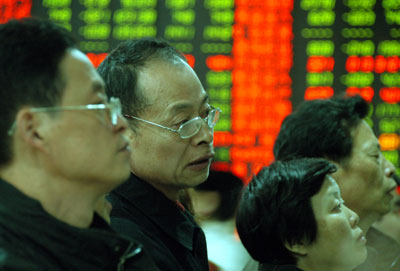Don't blame China for falling markets
Updated: 2007-03-07 09:05
 Investors look at stock information at a securities company in Shanghai February 27, 2007. [newsphoto]  |
http://www.iht.com/articles/2007/03/05/opinion/edbowring.php
HONG KONG: Given the current obsession with China's impact on the world economy, it is not surprising that it is widely believed that China set off the ongoing rout of global stock markets. But it is a misleading assumption.
In seeking why markets are falling and where they may go next, it is critical to distinguish between local and international factors.
China was actually not the first of the big bull markets to hit a wall. That distinction is held by Mumbai, whose stock index has fallen 15 percent since an all- time high last month. India's markets could have fallen much further than China's without attracting much international attention.
This time around, however, with the world so sharply focused on China, the 9 percent drop of its markets in February was widely perceived as the culprit for the general downturn. In fact, it was just a reminder of how far other markets have risen in the past year. The China market could be stabilized soon without others following suit — or vice versa.
China's experience does have one element in common with every other market, and it is the one which holds the answer to which countries will suffer most as the global boom turns to gloom or a real bust.
That is the availability and cost of money. It may not determine which market goes where. The Shanghai index, which had been up 140 percent over a year and trading on roughly 30 times earnings (estimates vary), was clearly looking a lot more expensive than the Dow Jones Industrials at 17 times earnings.
But money availability will determine the economic impact. On that score, China — and indeed most of East Asia — look to do relatively well compared with those countries with high external and household debt levels, such as the United States, Britain and Australia, or emerging economies like India, with a fast rising external deficit and galloping inflation.
The fact that most emerging markets have fallen even faster than the developed ones in recent days is due more to the fact that they had previously risen faster than that they are more vulnerable.
East Asia, Middle East oil producers, Russia and Brazil all have large surpluses which could be deployed at home rather than used to support Western markets.
None of them, with the exception of China and India, look especially expensive relative to the West, given that mostly superior economic growth prospects largely cancel out inferior corporate governance.
The root of the simultaneous rises of almost all markets, and the parallel decline in risk aversion, was the years of easy-money policy in the United States and Japan coupled with the massive increase in the U.S. trade deficit. The latter caused foreign reserves — and thus the monetary base of many countries — to rise at almost unprecedented rate.
China has been particularly impacted because capital inflows as well as its trade surplus have been huge, its exchange rate almost fixed, and its central bank lacking in effective market mechanisms.
This fueled the sustained boom in the Chinese economy, whose impact on stock prices was surprisingly muted until this past year. Japan and some other East Asian economies saw capital outflow, which negated much of their trade surplus. The now notorious yen carry trade — borrowing low-interest yen for reinvestment in higher yielding currencies — has been going on for years, but accelerated as the gap between Japanese and other rates increased.
But if the currency risk now looks more than likely to offset the interest rate reward the process will go into reverse, pushing up interest rates and weakening currencies of the borrowers.
The fear for East Asia is that this will cause demand by Western consumers, already almost exhausted, to drop further. The further rise in the yen and (due also to U.S. political pressure) the yuan will further squeeze corporate earnings.
These fears are justified. However, countries with strong currencies, high net worth and moderate inflation are clearly in a much better position to weather the storm of tighter global money.
Just as a decade ago the major Western economies and markets were only marginally impacted by the Asia crisis, so this time around Asia should be able to ward off the worst impacts of global financial disorder stemming from the simultaneous end of the consumer boom and the yen carry trade. But it will not be a comfortable ride for anyone.
Of course the big bust may not happen yet. The U.S. deficit may continue, the yen carry trade may resume, interest rates may remain low. But the longer it goes on the worse will be the eventual outcome.
Better a moderate crisis now than a huge one later.
|
||
|
||
|
|
|
|

